An Apple A Day Keeps The Maharishi Away: Strange Fruit DVD
Published on April 24th, 2012 in: Current Faves, Documentaries, DVD/Blu-Ray Reviews, Movies, Music, Reviews |By John Lane
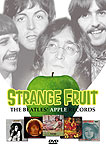
The Beatles’ mythology has become so ingrained in our culture that even I, a self-confessed Beatle nut, rarely have the energy anymore to restate or reexamine their history. If my kids have questions about the Fabs, I’m almost half-tempted to sigh and say, “Yes, they were four guys who all lived in a funhouse together. If they ventured outside for groceries, they’d hop in their Yellow Submarine while being chased by screaming fans. Yes, Paul was the cute one, John was the smart one, George was the quiet one, and Ringo was the minotaur at the end of the maze—so, who wants to listen to some Motorhead?”
(more…)
The King and (F.B.)I: Elvis Found Alive
Published on January 30th, 2012 in: Documentaries, DVD, DVD/Blu-Ray Reviews, Found Footage, Issues, Movies, Oh No You Didn't, Reviews |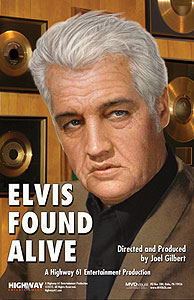
Elvis Presley is alive and well and living in Simi Valley. Or at least that’s the claim of Elvis Found Alive, a new faux-documentary from Highway 61 Entertainment, who brought you Paul McCartney Is Really Dead: The Last Testament of George Harrison (reviewed here). This time around, they’re doing a complete 180, revealing a conspiracy to fake a death instead of a life.
Catfish: Beyond Real And Beyond Fake
Published on January 30th, 2012 in: Documentaries, Found Footage, Issues, Media, Movie Reviews, Movies, Oh No You Didn't, The Internets |Living on the Internet means that you often have to dodge spoilers. Luckily, the Internet is also so crammed with information there are enough things with which to distract yourself.
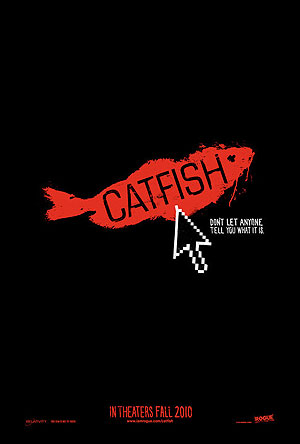
Such was the case with Catfish, a 2010 documentary that caught my attention via its unsettling trailer, which seemed like a faux documentary horror movie along the lines of The Blair Witch Project or the Paranormal Activity series. It was clear that an appreciation of the film was a case of “less is more,” so I added it to my DVD queue and successfully avoided spoilers for almost two years.
When I finally watched Catfish earlier this week, my stomach was in knots for at least 45 minutes until the movie completely . . . I’ll stop here because if you haven’t seen Catfish, you should watch it, and you should watch it not knowing any more than I did.
Catfish is a remarkable film and one that is thrilling, upsetting, disturbing, and moving. It makes incredible use of technology in its presentation of the Internet persona through GPS, Google, YouTube, Facebook, and all the other forms of social and searchable media we use every day. Such technology is so easily accessible and so widely used that it becomes a part of our lives that we take for granted, even though we assign it so much importance. We take all the veracity it reveals to us on faith.
As far as Internet personas, it’s common knowledge that we want to show everyone the best of ourselves, even if that means we make ourselves seem better than we are. But there is always a gap between our “real” selves and our Internet selves.
The width of this gap will likely determine how you treat your Internet friends. Do you treat them the same as your “real life” friends? Better? Worse? Do you subscribe to the “It’s just the Internet” theory to make yourself feel better about what you see and read there? The width of this gap will also determine how much Internet interactions affect you when you’re not on the Internet.
These were the ideas swirling around in my head right after I watched Catfish and right before I started looking up reviews online. Then, much like the film itself, everything changed. SPOILERS BEHIND THE CUT!
X: The Unheard Music: The Silver Anniversary Edition DVD
Published on December 20th, 2011 in: Blu-Ray, Current Faves, Documentaries, DVD, DVD/Blu-Ray Reviews, Movies, Music, Reviews |By Chelsea Spear

To the layperson in the early ‘80s, punk rock was an atonal mess of a sound made by destructive adolescent boys with an all-consuming hunger for amphetamines and an allergy to shirts. In the documentary X: The Unheard Music, director W.T. Morgan and the punk band X challenge these stereotypes by focusing on the creative process and the day-to-day experiences of a working band trying to find their audience.
(more…)
Top Five 1970s Films Directed by Women
Published on December 5th, 2011 in: Dancing Ourselves Into The Tomb, Documentaries, Feminism, Issues, Listicles, Movies, Staff Picks, Top Five Lists |By Chelsea Spear
If your knowledge of the American New Wave begins and ends with the studio films of the era and Peter Biskind’s Easy Riders, Raging Bulls, you may regard 1970s Hollywood as a roiling cauldron of testosterone. The pictures of the day may have featured more complex female protagonists, and may have ushered in an era of unconventional actresses like Shelley Duvall, Ellyn Burstyn, and Barbara Streisand. However, the exploits of Altman, Bogdanovich, Hopper, and Scorsese and their second-string peers left little room for emerging distaff talent.
As any good artist does, however, the female directors of the 1970s found a way around the system and were able to make feature films. Many of these saw distribution at mainstream houses, while others languished, undiscovered until recently. Here are five features helmed by intrepid lady lensers during the Easy Riders/Raging Bulls era.
(more…)
Jaws: The Shark Has Always Worked
Published on December 5th, 2011 in: Dancing Ourselves Into The Tomb, Documentaries, Issues, Movies |By Lisa Anderson
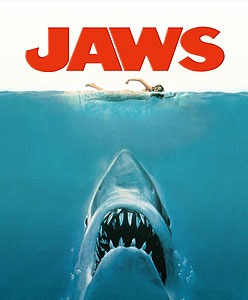
One of my favorite movies was released three years before I was born.
Jaws, the ground-breaking 1975 film by Stephen Spielberg, is one of the movies that I’ve seen more times than I can count. Like The Matrix, it’s also a film that I consider perfect; I can’t think of anything that could be added, altered, or removed to make it better. That’s not surprising, either; Jaws changed the way movies were made and marketed forever.
(more…)
FIX: The Ministry Movie, Directed By Douglas Freel
Published on October 18th, 2011 in: Current Faves, Documentaries, DVD/Blu-Ray Reviews, Movies, Reviews |By Danny R. Phillips
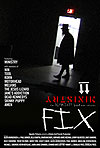
From the wind-ravaged land known as Chicago, Ministry and its lead freak Al Jourgensen, were key in the creation of the soul-rattling, abrasive form of rock known as Industrial.
FIX, a behind the scenes, eyes wide open look at the band during their 1996 SphincTour, is informative and unsettling all at once. So unsettling that Jourgensen tried to stop its release. Luckily for us fans, he recently dropped the lawsuit.
(more…)
Bob Dylan Revealed
Published on May 5th, 2011 in: Documentaries, DVD, DVD/Blu-Ray Reviews, Music |By John Lane
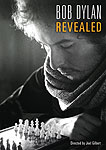
One can expect the usual onslaught of products and merchandise to cash in on Bob Dylan’s 70th birthday on May 1. Just as we have become used to more Beatles product every time Ringo coughs or Paul sneezes, so too must we be inundated with Bob Dylan product when he reaches a significant birthday mark.
(more…)
Portrait of a Reputation: The Woodmans
Published on March 30th, 2011 in: Art, Back Off Man I'm A Feminist, Documentaries, Feminism, Issues |By Chelsea Spear
The early months of 2011 find artist Francesca Woodman in the spotlight. After numerous solo shows throughout the United States and Europe, the photographer will be the subject of a career retrospective at the San Francisco Museum of Modern Art. Her work changes hands for hundreds of dollars. Established photographers like Cindy Sherman and Photoshop illustrators such as Rosie Hardy cite Woodman’s ethereal self-portraits as a key influence.
(more…)
A History Lesson, Part 1: Punk Rock in Los Angeles in 1984
Published on March 22nd, 2011 in: Culture Shock, Current Faves, Documentaries, DVD, DVD/Blu-Ray Reviews, Movies, Reviews, Underground/Cult |By Less Lee Moore
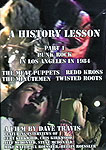
My interest in this documentary on some of the bands in the mid-80s L.A. punk scene was piqued by the inclusion of Redd Kross, which, as anyone who knows me will attest, is my all time favorite band. Not because they are necessarily the best band in the world, or the most famous, or the most infamous, but because they forever changed my life for the better, a topic too lengthy to get into here, but which is, unsurprisingly, completely relevant to a discussion of A History Lesson Part 1.
This is not your standard glossy, let’s-explain-why-punk-rock-is-so-important documentary. It’s comprised of old footage shot by Dave Travis, a fan and friend of the bands featured—The Meat Puppets, The Minutemen, Twisted Roots, Redd Kross—interspersed with current interviews from members of those bands. The immediacy and importance of all the bands is captured in the grainy footage, and rather than coming across as embarrassing, it’s completely invigorating.
(more…)